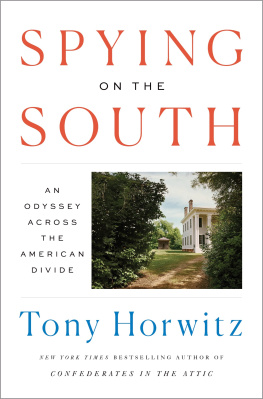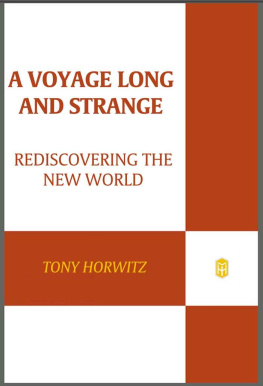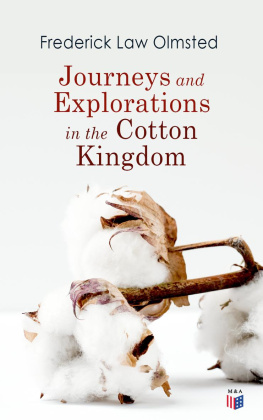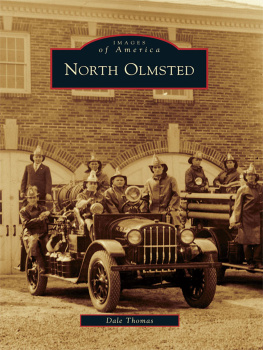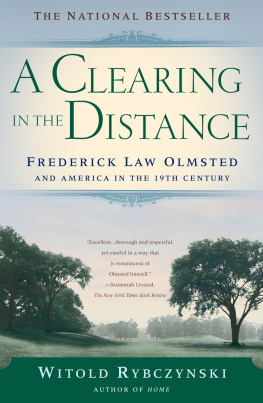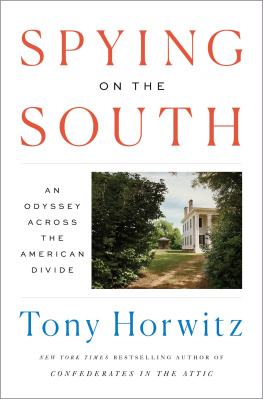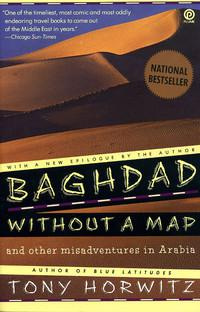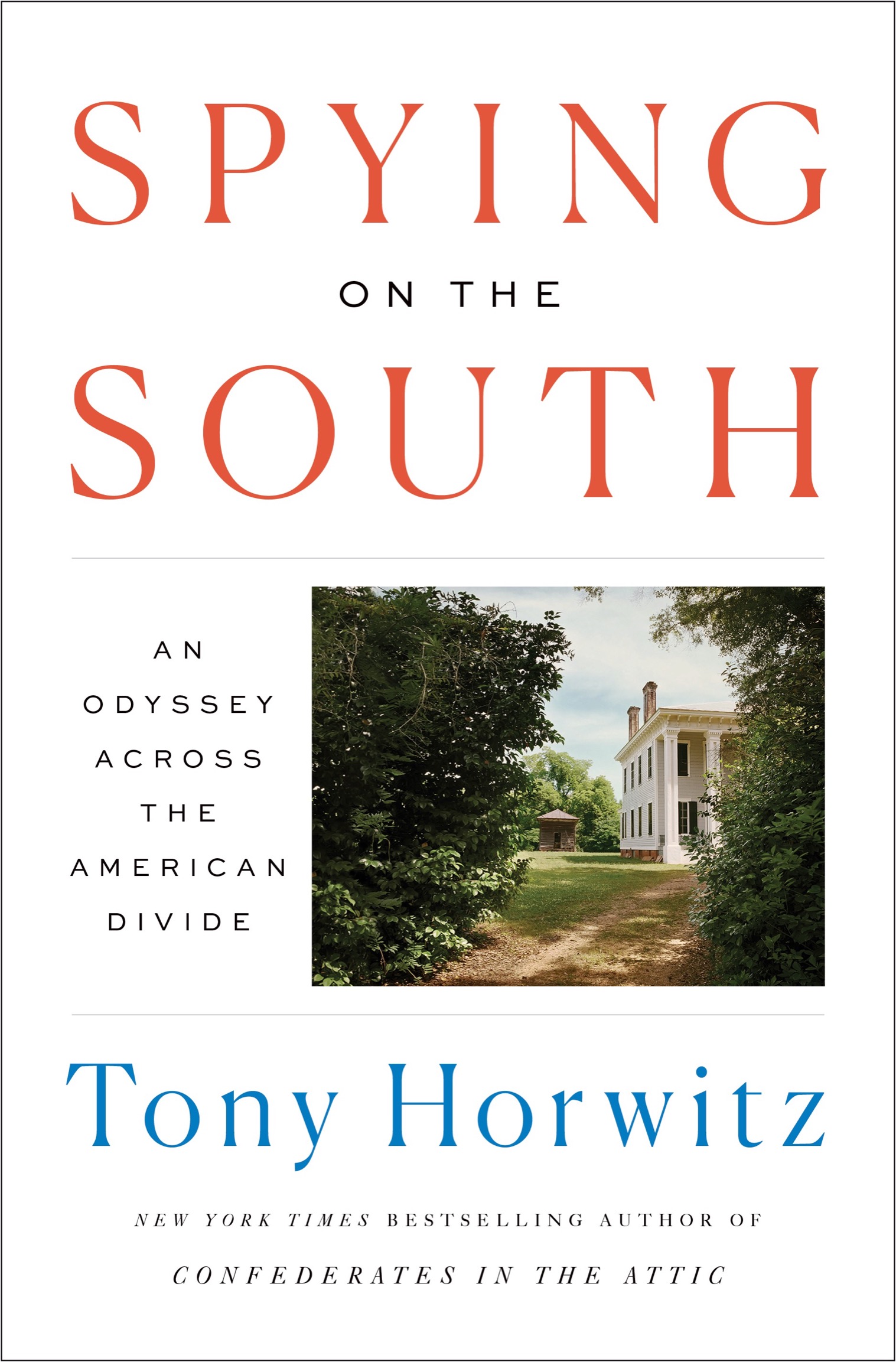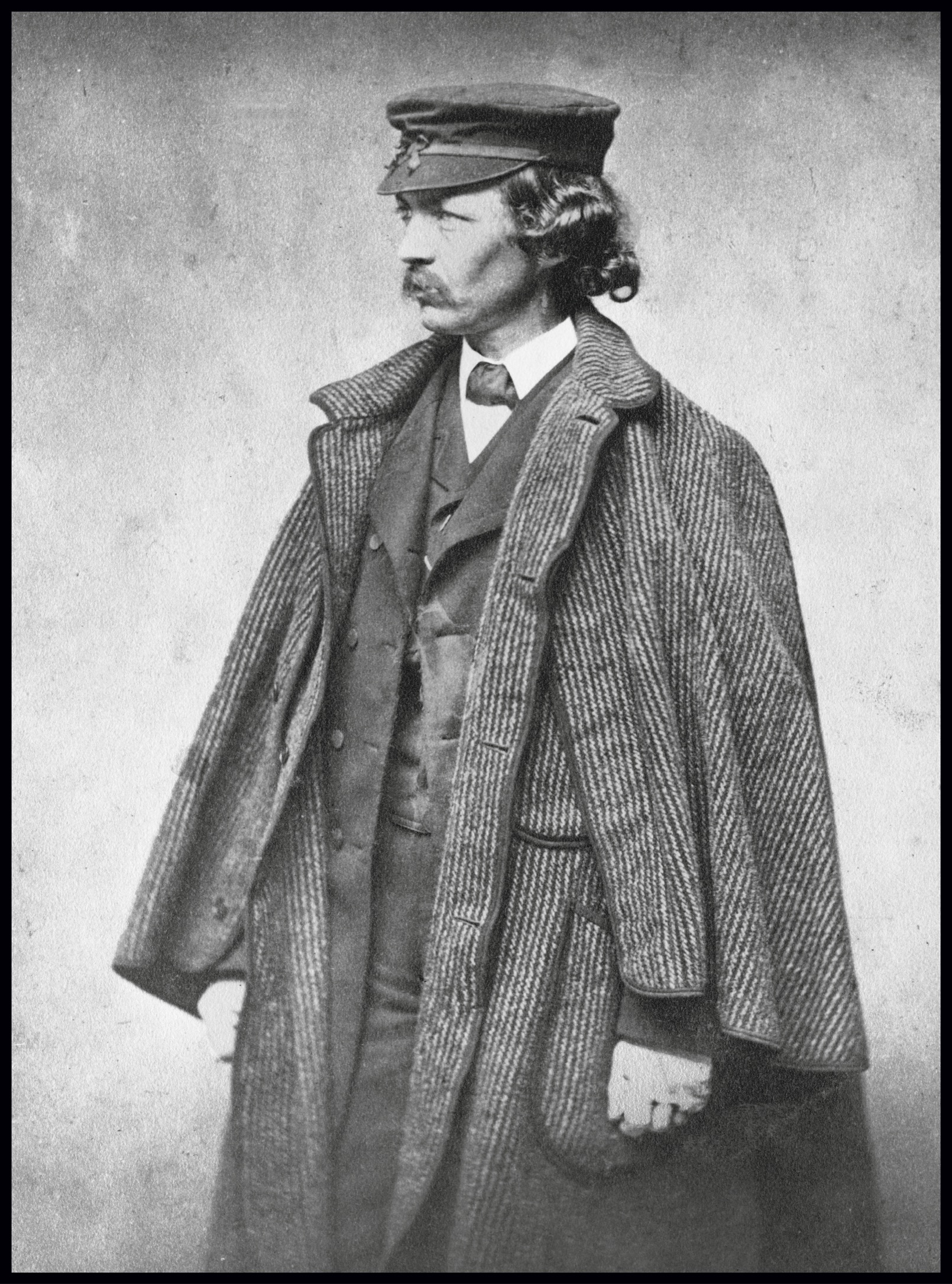Penguin supports copyright. Copyright fuels creativity, encourages diverse voices, promotes free speech, and creates a vibrant culture. Thank you for buying an authorized edition of this book and for complying with copyright laws by not reproducing, scanning, or distributing any part of it in any form without permission. You are supporting writers and allowing Penguin to continue to publish books for every reader.
Map illustrations by Jeffrey L. Ward
: Photograph courtesy of the National Park Service, Frederick Law Olmsted National Historic Site
Names: Horwitz, Tony, 1958 author.
Title: Spying on the South : an odyssey across the American divide / Tony Horwitz.
Description: New York : Penguin Press, [2019] | Includes bibliographical references and index.
Identifiers: LCCN 2018056912 | ISBN 9781101980286 (hardcover) | ISBN 9781101980293 (ebook)
Subjects: LCSH: Olmsted, Frederick Law, 18221903TravelSouthern States. | Horwitz, Tony, 1958TravelSouthern States. | Southern States--Description and travel.
Cover photograph of Webb-Bonds-Bamberg House, Greensboro, Alabama, ca. 1855 by Lauren Henkin
I WAS BORN FOR A TRAV ELER .
CONTENTS

PROLOGUE: AMERIC AN NOMAD
The only lodging in Grafton was a low-slung motel with a smashed door at the entrance. Stepping past shards of glass, I asked the clerk if there were any rooms available.
You a coal miner? he answered.
No. Why do you ask?
We sort of cater to them. Special deals.
If so, there were no takers in sight. On a raw Friday evening, my rental car was the only vehicle in the parking lot. The clerk nonetheless rummaged in a drawer for some time before handing me a key. Fifty bucks, he said.
Miner or not, this seemed like a deal. Until I reached my room: broken heater, broken window, beeping smoke alarm. Either the battery was dead or the last guest had tried to disable it. Cigarette butts swam in the toilet.
I went downstairs to a door by the shattered entrance marked Pub. Inside, two women stared at video slot machines. After a while one of them served me a beer. It was my second day on the road, and my first in West Virginia. It was also the last night of October, so I asked why I hadnt seen any trick-or-treaters on my way into Grafton.
Halloween was last night, the barmaid said. It was moved up to Thursday.
Whys that?
The other woman snickered. They say its because theres a high school football game tonight. Real reason? Parents didnt want their kids out on a Friday with all the drunks and meth-heads partying it up.
This was a haunting image: children staying home on Halloween because there were real zombies about. The women returned to staring at their screens, so I drained my beer and followed a road that wound between mountains and railroad tracks: Graftons main street. Midway along it, a neon sign winked from the window of a creosote-colored pool hall with yellow police tape strung across the door.
The crime scene dcor was a Halloween joke. Inside, a dozen people sat at a bar served by a woman dressed as Dorothy from The Wizard of Oz. As soon as I sat down, the man at the next stool bought me a beer. Dont see many new faces around here, he said, clinking bottles of Budweiser.
Ron Childers was a bullet-headed man in his fifties who repaired aircraft in the next county. Used to be a lot of coal and railroad jobs here, but by the time I left school you had to get out of Grafton if you wanted to work, he said. Burns my ass, people drawing welfare and doing drugs while Im busting my butt and paying taxes.
He then told me about a recent spate of drug arrests. Methamphetamines were so rife in West Virginia that cooks had adopted a crude method called shake and bake: tossing pills and volatile chemicals in soda bottles and driving around to mix the ingredients. Vans sometimes burst into flames in midday traffic, passengers fleeing the scene with their clothes on fire.
Those drugs make folks dumber than the retards in Wrong Turn, Ron said. When I looked at him blankly, he explained: Thats a horror flick set in West Virginia, about inbred mutants who trap and hack up people like possum. He smiled. Gotta have a sense of humor to take all the jokes about how backward we are.
Amen, interjected the man next to him. He turned to me. You know the toothbrush was invented in West Virginia?
No, I didnt.
Otherwise it would be the teethbrush.
Ron ordered us another round, and introduced me to a young woman named Jess, who wore a tank top, hot pants, fishnet stockings, thigh-high boots, and fake blood smeared across her neck and bare midriff. Jess worked on a road crew but was clad for Halloween as a member of a heavy metal band, the Butcher Babies.
Im that one, Carla, except for the knife in the vagina, she said, displaying a picture on her phone of a singer thrusting a bloody dagger at her crotch.
Jess looked up from her phone and studied my costume. Jeans, work boots, plaid shirt, horn-rimmed glasses, dun Carhartt jacket with a notebook and pen stuck in one pocket. Let me guess, she said in an exaggerated drawl. Yankee boy, spyin on us hillbillies?
This was uncomfortably close to the mark. I couldnt muster a witty comeback, so I told her a version of the truth: I was doing research on a famous American who came through here in the 1800s.
Jess pondered this for a moment. Okay, history guy, heres a question, she said. Did you know Mothers Day was invented in Grafton?
I shook my head, awaiting the punch line. Some joke about incest?
Instead, Jess led me to the door and pointed down Main Street. Few blocks that way, big-time shrine to all our great moms. Then she turned to greet a friend and share her Butcher Babies picture again.
Walking through the drizzle, I reached a statue of a mother and child beside an old church. A historic plaque identified this sanctuary as the site of the first Mothers Day observance, in 1908.
A much larger building loomed directly across the street: an ornate brick-and-granite pile with massive columns, evidently a relic of the towns better days. The hulking edifice was vacant and in poor repair. But at its crown, above elegantly hewn laurels, I could make out the letters B&Othe bygone rail line I was following through the hills, on the trail of a long-ago traveler.
In 1854, a roving correspondent for the New-York Daily Times

